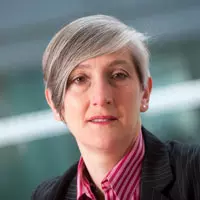Existentialism suggests that human beings live in a state of permanent anguish, because we’re "condemned to be free". We are thrown into existence and, as self-aware beings have to make choices, every choice revealing what we think a human being should be. But if you are neurodiverse and undiagnosed, you may be making choices for reasons that you don't fully understand or making "socially acceptable" choices which don't work for you, which can lead to poor mental health and worse (google "neurodiversity" and "youth criminal justice system" if you want to know more).
So how does this impact women and girls and what does this have to do with me?
Two to three times as many boys are diagnosed with ADHD as girls. This is partly because traditionally, ADHD was only thought to affect boys and partly because girls tend to exhibit fewer obvious or socially disruptive symptoms. Men and boys tend to have hyperactive/impulsive ADHD, which may cause them to be fidgety, disruptive, restless, talkative, impulsive, impatient and have mood swings, whereas women and girls tend to exhibit inattentive ADHD, finding it hard to focus, pay attention to details, stay organised, listen and remember things.
When girls exhibit inattention or impulsivity, it is often viewed as a personality trait rather than a symptom; they may be characterised as "daydreamers" or "chatty", and when they reach out for help they may be diagnosed with depression or anxiety rather than a neurodiverse condition. Our culture commonly expects women to fill the caretaker role, but when it's difficult to organise and plan, taking care of others can feel impossible. Because women with ADHD may not be able to do the things that society expects women to do, like remember birthdays or the names of their colleague's children, people may think they don't care. Societal pressure also may increase neurodiverse women's feelings of inadequacy, leading to low self-esteem and chronic stress.
I don't have a diagnosis of ADHD, because it didn't occur to me that I might have ADHD until my eldest son was diagnosed a couple of years ago. ADHD has a strong genetic component and looking back on my old school reports, I see frequent references to being unable to sit still, chatting in class, interrupting people and not paying attention, as well as enthusiasm and detailed knowledge about topics of interest. These comments are fairly suggestive of ADHD and those who work with me now will be aware of my ability to forget people's names, case names, meetings or even what day of the week it is, but equally my ability to focus deeply and sometimes produce unexpected solutions.
I can't point to particular coping strategies other than diarising everything (though even then I often forget to check my diary) and I believe the reason things worked out well for me is mainly down to chance. I hadn't made a lot of friends at school. I was generally liked, but most people found me weird. The feeling was mutual; I didn't understand what made most of my classmates tick. When I went to university, I suddenly found a lot of people who were like me. I rationalised it in a number of ways, particularly that I had been at a girl's school where my interests (catastrophe theory, science fiction, protest music, politics, the works of Thomas Hardy, feminism etc) weren't valued and where one was expected to dress like the Princess of Wales rather than in clothes made out of psychedelic furnishing fabric, whereas now I was in a more intellectual environment where everyone wanted to know everything about everything.
Ursula Le Guin said, “There’s a point, around the age of twenty, when you have to choose whether to be like everybody else the rest of your life, or to make a virtue of your peculiarities". Having found my tribe (male and female) at about that age, I was fortunate to be able to choose to be me and not what others perhaps thought I should be, although it took me until my late thirties to begin to understand how to make a virtue of my differences (and only found this quote at some point in my fifties).
Adults who receive a neurodiversity diagnosis often describe this as an existential crisis. They question choices – was it me or the ADHD? - and this causes them to question who they are. It can be easier for men, ADHD characteristics can mellow with age and many are seen as forms of typical male behaviour; also men have traditionally found it easier to live with the label "eccentric". It can be harder for women, as in order to improve their mental health they may be forced to step away from social expectations of female behaviour, which although ill-fitting may be comforting and familiar. Looking at my friends now, large numbers of them have neurodiversity diagnoses or are in assessment pathways, so while I did find my tribe, it wasn't the tribe I thought I'd found, though it was the one that I needed.
Over International Women's Day we typically see and send messages of support and empowerment. For neurodiverse women, having the ability to be different and to have that difference accepted is a key part of this message. Yoko Ono says "You change the world by being yourself". I am not sure I'd go quite that far, but for me at any rate, I am glad that I did not spend significant amounts of time trying to be other people.











